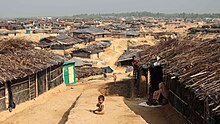
Rohingya refugees in Bangladesh mostly refer to forcibly displaced Myanmar nationals from Myanmar who are living in Bangladesh.[1][2] The Rohingya people have experienced ethnic and religious persecution in Myanmar for decades. Hundreds of thousands have fled to other countries in Southeast Asia, including Malaysia, Indonesia, and Philippines.[3] The majority have escaped to Bangladesh, where there are two official, registered refugee camps. Recently violence in Myanmar has escalated, so the number of refugees in Bangladesh has increased rapidly. According to the UN Refugee Agency (UNHCR), more than 723,000 Rohingya have fled to Bangladesh since 25 August 2017.[4][5][6][7]
On 28 September 2018, at the 73rd United Nations General Assembly (UNGA), Bangladeshi Prime Minister Sheikh Hasina said there are 1.1 million Rohingya refugees now in Bangladesh.[3] Overcrowding from the recent population boom at Bangladesh's Rohingya refugee camps has placed a strain on its infrastructure. The refugees lack access to services, education, food, clean water, and proper sanitation; they are also vulnerable to natural disasters and infectious disease transmission.[8][9][10][11] As of June 2018, World Bank announced nearly half a billion dollars in monetary support to help Bangladesh address Rohingya refugees' needs in areas including health, education, water and sanitation, disaster risk management, and social protection.[12] On 1 March 2019, Bangladesh announced that it would no longer accept Rohingya refugees.[13] An August 2018 study estimated that more than 24,000 Rohingya were killed by the Myanmar military and local Buddhists militia since the "clearance operations" started on 25 August 2017. It also estimated that at least 18,000 Rohingya Muslim women and girls were raped, 116,000 Rohingya were beaten, and 36,000 Rohingya were thrown into fires set alight in an act of deliberate arson.[14][15][16][17][18][19] On March 5, 2023, a massive fire broke out in the Balukhali camp in Cox's Bazar district, leaving an estimated 12,000 people without shelter.[20] No casualties have been reported, but the fire on Sunday razed 2,000 shelters after spreading quickly through gas cylinders in kitchens.[21]
- ^ "Rohingya exodus to Bangladesh nears 300,000". Muslim Global. Retrieved 9 September 2017.
- ^ "Rohingya refugees in Bangladesh face relocation to island". BBC News. 30 January 2017. Retrieved 20 March 2017.
- ^ a b "Bangladesh point finger at Myanmar for Rohingya 'genocide'". Associated Press. 27 September 2018.
- ^ WAM (27 December 2017). "UAE Press: We must resolve to aid all refugees". Emirates 24|7. Retrieved 28 December 2017.
- ^ "Rohingya crisis: Myanmar Court extends detention of two journalists". Asian News International. Retrieved 28 December 2017.
- ^ "Bangladesh: Humanitarian Situation report No.16 (Rohingya influx) 24 December 2017". ReliefWeb. Retrieved 28 December 2017.
- ^ Minar, Sarwar J.; Halim, Abdul (2020). "The Rohingyas of Rakhine State: Social Evolution and History in the Light of Ethnic Nationalism". Social Evolution & History. 19 (2). arXiv:2106.02945. doi:10.30884/seh/2020.02.06. ISSN 1681-4363. S2CID 229667451.
- ^ Cite error: The named reference
:1was invoked but never defined (see the help page). - ^ Cite error: The named reference
:2was invoked but never defined (see the help page). - ^ Cite error: The named reference
:15was invoked but never defined (see the help page). - ^ Cite error: The named reference
:8was invoked but never defined (see the help page). - ^ 张锐 (29 June 2018). "World Bank announces nearly half-a-bln USD support for Bangladesh to help Rohingya". China.org.cn. Retrieved 6 July 2018.
- ^ "Rohingya crisis: Bangladesh will no longer take in Myanmar refugees - BBC News". BBC News. March 2019.
- ^ Habib, Mohshin; Jubb, Christine; Ahmad, Salahuddin; Rahman, Masudur; Pallard, Henri (18 July 2018). "Forced migration of Rohingya: the untold experience". Ontario International Development Agency, Canada – via National Library of Australia (new catalog).
- ^ "Former UN chief says Bangladesh cannot continue hosting Rohingya". Al Jazeera.
- ^ "Dutch House of Representatives adopts motion for probe on Rohingya genocide". The Daily Star. 5 July 2019.
- ^ "Bangladeshi PM calls for safe repatriation of Rohingya". 4 April 2019.
- ^ "UN Official Cites Horrific Crimes against Rohingya". TRANSCEND Media Service.
- ^ Khan, Ahmed; Ahmad, Salahuddin; Habib, Mohshin (15 May 2019). Prevalence of violence against children: Evidence from 2017 Rohingya Refugee crises. Pre-Refugee Workshop. Faculty of Arts and Social Sciences (FASS), University of Technology, Sydney.
- ^ A massive fire tore through a crowded Rohingya refugee camp in Bangladesh, Associated Press (via NPR), March 5, 2023. Retrieved March 6, 2023.
- ^ "Bangladesh investigates huge fire at world's largest refugee camp". BBC News. 6 March 2023. Retrieved 12 May 2023.